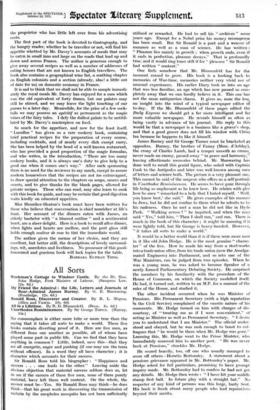All Sorts
No commonplace is either more trite or more true than the saying that it takes all sorts to make a world. These five books contain diverting proof of it. Here are five men, as different from one another as possible, all of whom have Played some part in public life. Can we find that they have anything in common ? Little, indeed, save this—that they are all energetic, eager and pushing (if one may use the term without offence). In a word they all have character ; it is character which accounts for their success.
Sir Ronald Ross told his biographer : " Happiness and success . . . one leads to the other." Leaving aside the obvious objection that material success seldom does so, let us see if the careers of these five men, none of them purely material, have left them well content. On - the whole, the answer must be--Yes. Sir Ronald Ross may think—he does think—that his great work in discovering the transmission of Malaria by the anopheles mosquito has not been Sufficiently
utilized or rewarded. He had to sell his " archiVes " some years ago. Except for a Nobel prize his money recompense has been small. But Sir Ronald, is a poet and a weaver of romance as, welt as a man of science. He has written .:
Pleastire ties mainly in growth ; when 'growth ends, even if it ends in perfection, pleasure decays." That is profoundly true; and it would ring truer still if for " Measure " Sir Ronald had written " content."
One feels somehow that . Mr. Blumenfeld has for the Moment ceased to grow. His book is a harking back to Memories of War-time, memories neither very vivid nor of unusual experiences. His earlier Diary took us into an age that was 'less familiar, an age which has now passed so coin- pletely away that we can hardly believe in it. This one his not the same antiquarian' charm. It gives us, none the less. an insight into the mind of a typical newspaper editor of to-day.. If the Mr. Blumenfeld of these pages edited th Daily Express we should get a far more intelligent and far more valuable newspaper. He reveals himself so often as being vastly in advance of his journal. His . reply to tliis Would be that a newspaper is a business like a grocer's shop, and that a good grocer does not fill his window with China tea because he happens to like it himself. . James Burney and Sir George Turner must be bracketed avi opposites. Burney, the brother of Fanny (Mine. cl'Arblas); the crony of Chirles Lamb, had a temper 'smooth as cream never made an enemy, passed away " in peace and harmony," leaving affectionate memories behind. Mr. Manwaring hes done well to recall this genial figure, who sailed with Captain Cook to the Antipodes and later was well known among men of letter's and science bOth. The picture is a very pleasant one .Thiscannot be said of the surgeon who offers us a nelf-loortraii in Unorthodox Reminiscences. He seeins.tO have gone througli life being'as unpleasant as he knew how. He relates with glee how he once " remarked to a lady that I hated myself. Well; you know best,' she said." He gives examples of his manner to Jews, but he did not confine to them what he admits to be his rudeness.' Once he met a man he did not like in Hyde " Walking across ? " he inquired, and when the man said " Yes," told him, " Then I shall run," and ran. There is much-in the book of this character '; it might be amusing if it were lightly told, but Sir George is heavy-handed. However, `' it takes all sorts to make a world."
. It would be a betterWorid than it is if there were more men in it like old John Hodge. He is the most genuine " charac- ter " of the five.. How he made his way from a steel-works into a trade union office, from his trade union (now the Amalga- -mated Engineers) into Parliament, and so into one of the :War Ministries, can be judged from two episodes. When he was a young man, he was asked to become Speaker of a newly formed Parliamentary Debating Society. He surprised the members by his familiarity with the procedure of the House of Commons, on which the Society modelled itself. He had, it turned out, written to an M.P. for a manual of the rules of the House, and studied it.
- The other incident occurred when he was Minister of
Pensions. His- Permanent Secretary (with a high reputation in the Civil Service) complained of the caustic nature of his comments. Mr. Hodge turned on him with charges of dis- courtesy, of " treating me as if I were non-existent," of acting as Minister as well as Permanent Secretary. " I desire you to understand that I am Minister." The official under- stood and obeyed, but he was rash enough to boast to col- leagues that " he would be there when Mr. Hodge was gone." Learning this, Mr. Hodge went to the Prime Minister, who immediately removed him to another post. " He was never back at Pensions," chuckles Mr. Hodge.
He scored heavily, too, 'off one who usually managed to
score off others—Horatio Bottomley. A statement about a pensions grievance appeared in Mr. Bottomley's paper. Mr. Hodge asked for full _particulars, promising to have prompt inquiry made. Mr. Bottomley had to confess he had not got any details. Mr. Hodge then wrote : "-I haVe hit your middle stump first ball.' In- future play with a Straight bat." No respecter of any kind of persons was this large, burly Scot. His book is frank about many people who had reputations beyond their merits.














































 Previous page
Previous page